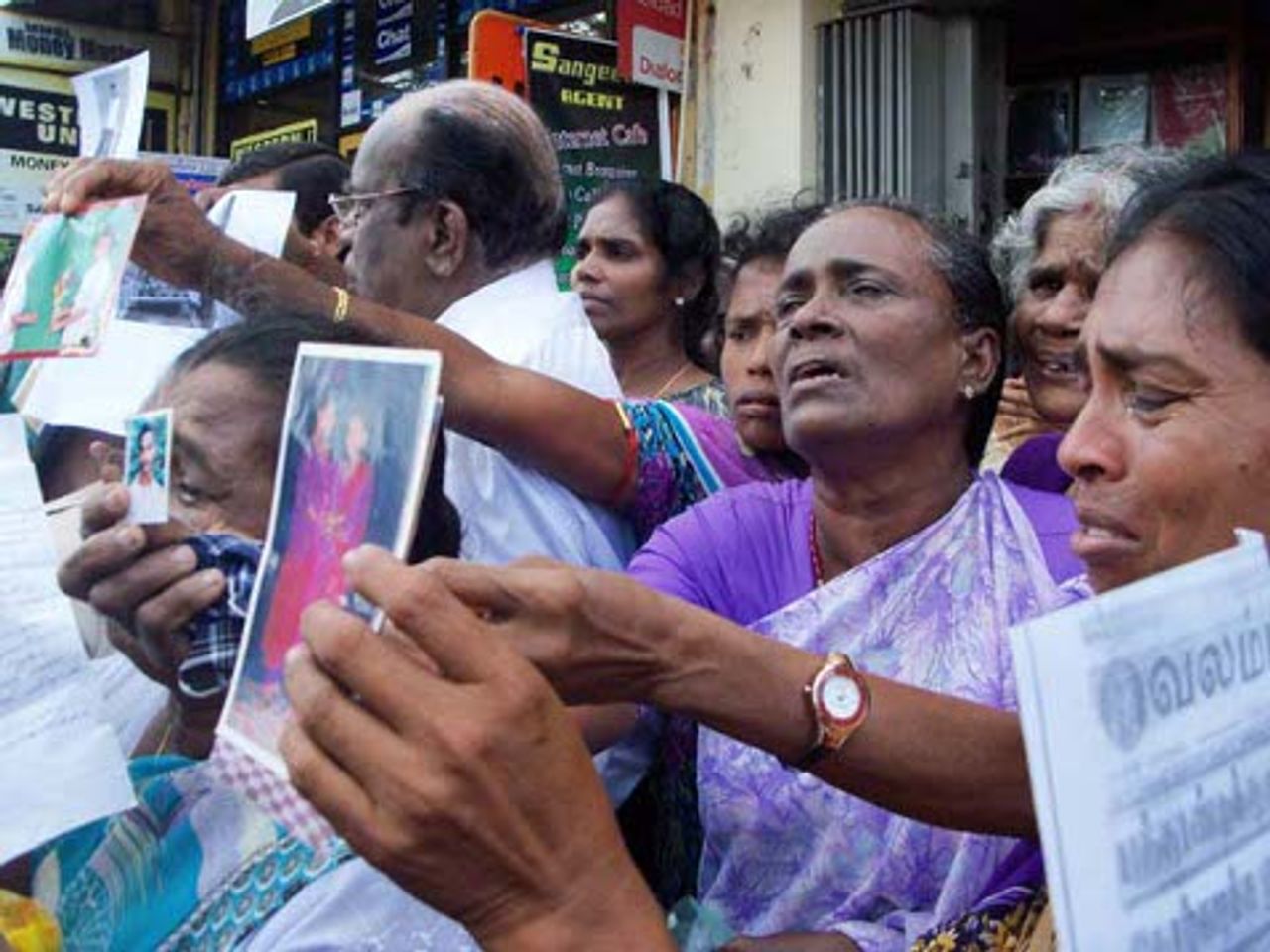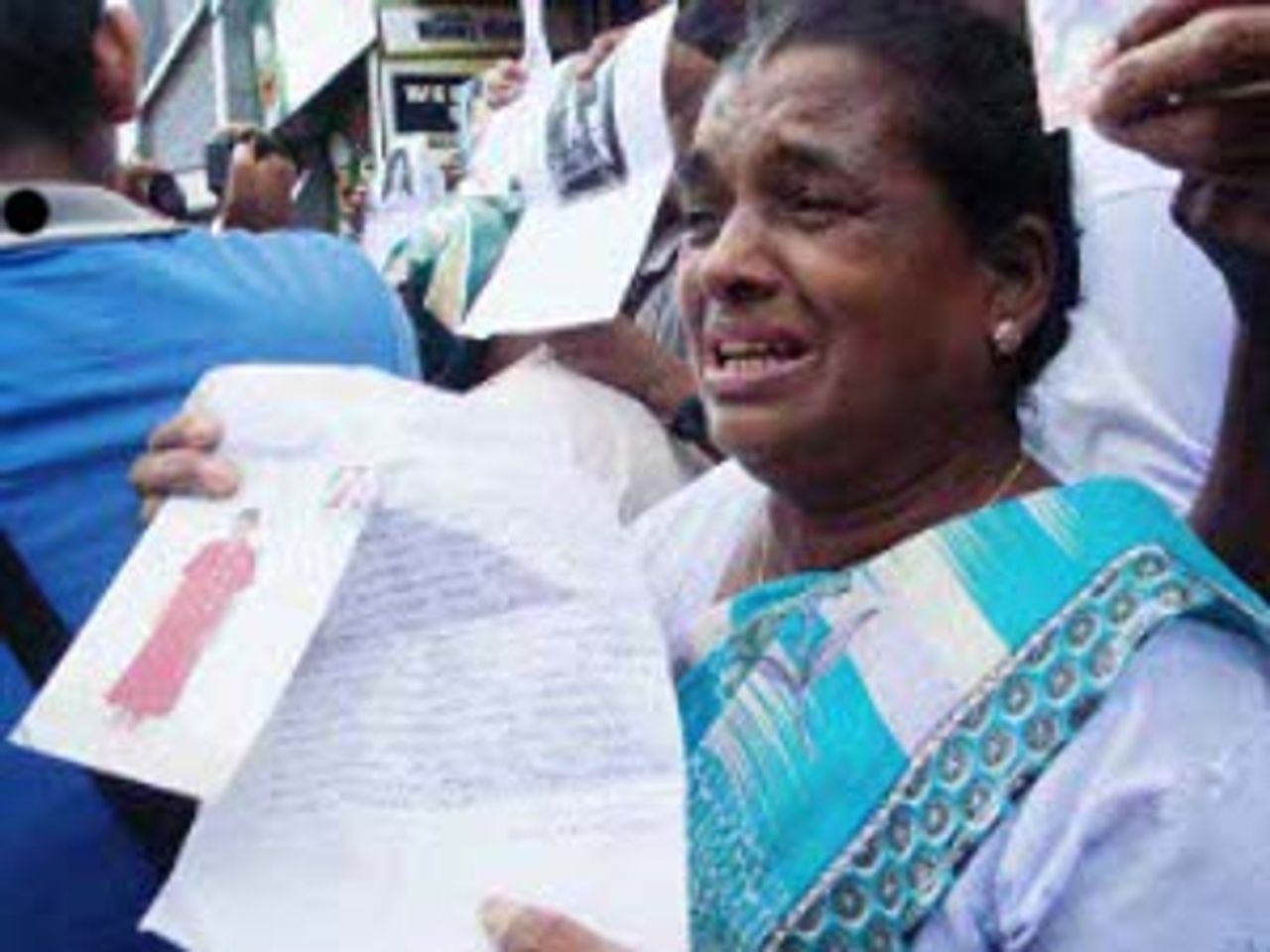Amid police and military threats, about 200 mothers, wives and other relatives of disappeared persons held a protest on December 10 in Jaffna, northern Sri Lanka, to demand information about their loved ones.
Hundreds of Tamils “disappeared” during the 26-year communal war against the separatist Liberation Tigers of Tamil Eelam (LTTE), particularly during the military offensive before its defeat in May 2009. Despite their denials, the military, police and associated paramilitary groups are directly implicated in these abductions and murders.
Such disappearances occurred not only in the North and East, but also in other areas, including Colombo. The security forces turned a blind eye as squads of thugs, often operating from white vans, seized people, mostly Tamils. The victims simply vanished and were likely murdered. These methods were bound up with the government’s police-state measures to silence political opponents and critics.
 A section of the protest
A section of the protestThe protest was organised by several organisations, including Right to Life and the International Movement against Discrimination and Racism (IMADR). It was backed by the Tamil National Alliance (TNA), a bourgeois Tamil-based party, and several ex-left organisations, including the Nava Sama Samaja Party (NSSP).
Although the protesters genuinely wanted information about their loved ones, the organisers had their own agenda. TNA secretary Mavai Senathirajah told the gathering: “The UN should inquire into the Sri Lankan government’s human rights violations. These inquiries should be done publicly. Only that way people will have confidence.”
The TNA’s appeal to the UN for an investigation is a continuation of its futile appeals in the final months of the war for the “international community” to ask President Mahinda Rajapakse to end the military offensive. The US and other major powers are not defenders of democratic rights in Sri Lanka, but are using the issue of disappearances and other abuses to advance their own strategic and economic interests.
The TNA is seeking the support of these powers to pressure the Rajapakse government to grant it a role in administering the North and East on behalf of the Tamil ruling elite. The NSSP has stepped in to boost the TNA’s tattered credentials as the TNA seeks to re-establish itself within the Colombo political establishment.
The protest was held near the Jaffna central bus-stand and involved people from various parts of Jaffna Peninsula, Kilinochchi, Mullaithivu and Vavuniya, as well as Colombo. The army set up checkpoints at several junctions to harass and intimidate people going to the venue. People travelling the 30 kilometres from Point-Pedro to Jaffna had to pass through eight checkpoints.
Police vehicles patrolled Jaffna town. A squad of riot police was stationed about 75 metres away from the protest. Dozens of police and military intelligence officers were seen watching the area. Police had been mobilised at the bus-stand to threaten protesters and tried to drive them away. People refused to leave, arguing with police that they had the democratic right to conduct the agitation.
Police arrested Socialist Equality Party (SEP) member M. Kamaladasan while he was distributing an SEP statement on its campaign to demand the release of all political prisoners. He was kept at the Jaffna police station for more than one hour and only set free after SEP General Secretary Wije Dias spoke to the officer in charge and insisted on the party’s democratic right to campaign. Police also tried to harass journalists covering the protest.
Participants chanted slogans, including “Release our children, Release our loved ones. Where have they gone?” They displayed pictures of the disappeared persons.
SEP member Nadarajah Wimaleswaran, 27, and his friend, Sivanathan Mathivathanan, 24, disappeared in the Velanai area in Kayts while travelling from Punguduthivu Island on March 22, 2007. All the evidence pointed to the involvement of the Sri Lankan navy, but the military, police and judicial authorities covered up the crime.
 Weeping mother with photo of her disappeared daughter
Weeping mother with photo of her disappeared daughterThe response of the security forces to the protests underlines the government’s fear over the mounting anger among Tamils to the continued military occupation of the North and East. During the final months of the war, the military’s air and artillery bombardment killed thousands of civilians. Around 300,000 men, women and children were herded into military-run detention centres and held without charge for months before being “resettled” into tents or makeshift shelters with little or no financial assistance.
There have been several protests in recent weeks. Jaffna university students boycotted classes for one week demanding the arrest of military personnel who attacked student leaders, including the student union president. Volunteer teachers have held a demonstration to demand permanent jobs. On December 6, unemployed graduates picketed outside the provincial governor’s office calling for jobs.
The WSWS spoke to several of the participants in the latest protest. A mother of three children explained her plight: “My husband went to obtain a pass to travel to Colombo in January 2007. At that time, the army unit stationed near the Sinhala College issued the passes. My husband did not return. I came to know that my husband was seized by the army there. I still search for him, going from one place to another. I am demanding his release. I work as a housemaid and struggle to bring up my children. We are terribly poor and helpless.”
One mother held up a photo of her daughter, Nadarajah Navaranjini, who was 27 years old when she disappeared in the Vanni area of northern Sri Lanka in 2009. The weeping mother made a desperate appeal to know her daughter’s whereabouts. The former was held at the military-controlled Manik Farm camp, where more than 250,000 civilians were incarcerated after the war. Now she lives as a refugee in Jaffna.
Another woman said: “On May 18, 2009—the final day of the war—we surrendered to the army at Vattuvaikkal in Mullaithivu with a group of other people. My husband, Mahendran Murugathas, 33, was arrested by the army. When I begged for his release, the soldiers said they would free him after an inquiry. They asked me to go to the camp. In front of my very eyes, the army took my husband, along with 40 others, onto a bus. I wandered to several camps in search of him. Still I have no news about him. The army arrested him. They should release him.”
